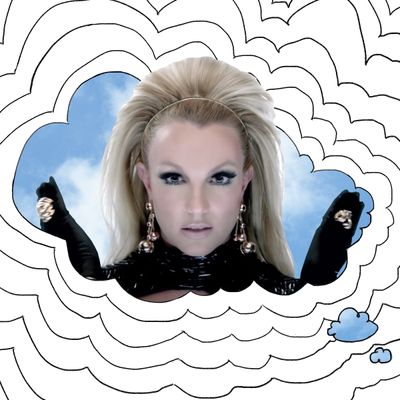
I Think About This a Lot is a series dedicated to private memes: images, videos, and other random trivia we are doomed to play forever on loop in our minds.
Whenever I need to replenish my sense of wonder about the world, I return to will.i.am’s 2012 song “Scream & Shout,” featuring Britney Spears at her most wonderfully befuddling: as a wannabe Englishwoman.
The music video opens onto Britney dressed in a sparkly pencil skirt, a cut-out top and long sheer black gloves, mane teased high. She coils her hands around her face, multiplies like in a hall of mirrors and then contracts again back into a single Britney, all the while proclaiming that “when you heah this in the clob, you gonna turn this shi’ up! You gonna turn this shi’ up.”
The first time I heard the song, I was riveted. Why was she speaking with this accent, and what even was that accent, exactly? One moment, she seems to be going for Kate Middleton–style plummy poshness — “all eyes on auss,” she drawls, sat on a rotating white platform like a spinning cake topper — the next, she’s giving us her best shot at an East London glottal stop (“turn this shi’ up”). None of it makes any sense; every time, I’m mesmerized. Apparently, so was everyone else: the song hit No. 3 on the Billboard Top 100 and topped the charts in 24 different countries. That’s perhaps the funniest thing about the song: It did get played in “clobs” around the world.
According to will.i.am, Britney was inspired by hearing the song’s demo version, in which co-writer Tulisa Contostavlos, who is from the U.K., did her lines. Britney loved what it sounded like, and decided to roll with it: “I like playing characters,” she apparently told him.
She’s not the first artist to have made a bid for across-the-pond cool. During her marriage to Guy Ritchie, Madonna briefly adopted a faux-British accent. Lindsay Lohan, who as a kid played twins — one English, one American — in The Parent Trap, has occasionally affected that same English accent in recent years. I find it fascinating when celebrities decide to try on a new identity. It’s easy to see how that might have been tempting for Britney in 2012, post-breakthrough and breakdown, so famous she’d almost become a hologram of herself.
British accents happen to be famously hard to imitate. (My best friend, who is English, distinguishes between two categories: “convincing” and “pirate.”) In more serious contexts — a period drama, say — those clumsy attempts can be distracting, but what I love about Britney’s all-over-the-place accent in “Scream & Shout” is that it’s actually kind of sweet
The way she croons “all eyes on auss” reminds me of playing dress-up as a kid, wearing my dad’s XL white T-shirt as Cinderella’s wedding dress. It’s reaching for a half-understood idea of sophistication, a dalliance with a different self. (In a radio interview from the same era, Britney trots out the same accent, suggesting to the DJ they have “a spot of tea” before collapsing into giggles.) But it’s also unapologetically goofy, her equivalent of a Dollar Store fake beard and sunglasses. It’s clear that it’s an act — we never lose sight of the American Britney underneath. And I like that, because having an utterly convincing foreign accent has often left me a bit confused about where I belong.
As a teenager stuck in small-town Holland, I gorged myself on Buffy, B movies — pretty much all U.S. media I could get my hands on. By the time I left the Netherlands several years later, I had absorbed an American accent so thoroughly that no one ever guessed I was Dutch. I was kind of flattered—I’m a perfectionist, and blending in feels like mastery. Being taken for an American was my first experience of fitting in rather than standing out.
But my success has always been accompanied by anxiety: the niggling worry that I’m blending in too well. I’ve lived in five different countries and have a lot of experience being the stranger. In the U.S., people tend to assume I’m at home. But I “belong” because of a misperception, and it can feel strange, like sailing under a false flag. Sometimes I wonder where the line between my “assumed”and “real” identity lies. Am I still a European pretending to be American, or am I an American who used to be Dutch? Is there an authentic me beneath my “fake” me?
At the same time, I know that distinction’s kind of dumb, that all of us are half-human, half-cartoon. (“It’s Britney, bitch.”) Ultimately, Britney reminds me not to get too caught up in ideas about authenticity, questions of what her, or my, “real voice” might be. Sometimes our false beard is the most compelling thing about us.

